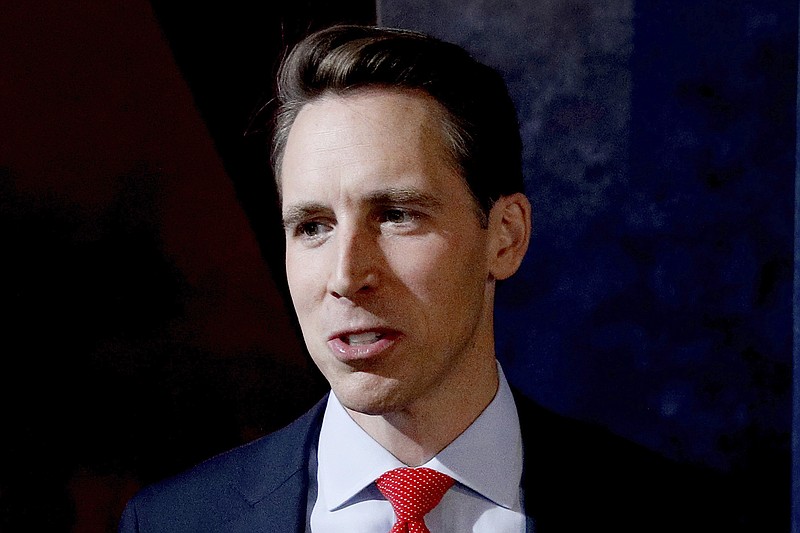St. Louis attorney Elad Gross on Tuesday planned to serve U.S. Sen. Josh Hawley, Missouri's former attorney general, with a subpoena to testify in a deposition.
"Hawley will have to answer questions under oath about his involvement in violating Missouri's public records law during his time as Missouri's attorney general," Gross said in a Tuesday news release.
But Kelli Ford, spokeswoman for Hawley's U.S. Senate office, said Tuesday: "This is a political stunt by a political candidate. It's unfortunate that Democrat operatives continue to misuse our courts of law for political purposes."
Gross has said he's running for the 2020 Democratic nomination to be Missouri's next attorney general.
Ford said Hawley intends to ask the court to quash - that is, block or declare invalid - the subpoena because "it's a frivolous request. (Hawley) isn't party to the lawsuit."
The only defendants in the suit that Gross filed Oct. 18, 2018, are Gov. Mike Parson and Michelle Hallford, the custodian of records in the governor's office.
Cole County Circuit Court officials issued the subpoena Monday as part of Gross' ongoing lawsuit, seeking public records "of communications between the governor's office and 27 groups and individuals Gross identified in his (separate) dark money investigation," according to Gross' news release.
The subpoena asks Hawley to be deposed on a date Gross will determine and that Hawley is to bring "any and all communications, recordings, calendars, notes, and/or enforcement of Missouri's Sunshine Law regarding Elad Gross's Sunshine Requests made to the Missouri Governor in 2018."
Part of his lawsuit alleges Parson and now-Sen. Hawley cooperated last year to prevent the release of public records that would hurt Hawley's 2018 campaign for the Senate seat that then was held by Democrat Claire McCaskill.
Gross, a former assistant attorney general under Chris Koster, has complained - even before filing his lawsuit on Oct. 17 - that the governor's office's initial response to his records request was to report it had found "13,659 documents that may be responsive" to the request, but that it would cost $3,618.40 for "90.46 hours, at $40.00/hour" of "research/processing" time to produce those records, and it would take at least four months before Gross would receive any of the records.
Missouri's "Sunshine Law" allows government agencies to charge for research and copying of materials that are sought in a request made under the law.
But the law also allows the agencies to waive the charges or impose a reduced charge "when the public governmental body determines that waiver or reduction of the fee is in the public interest, because it is likely to contribute significantly to public understanding of the operations or activities of the public governmental body, and is not primarily in the commercial interest of the requester."
Gross asked the governor to waive the fee, stating that the public had a significant interest in seeing the records.
His news release noted that, after the governor "refused to change his mind, Gross filed (the) lawsuit," which was assigned to Cole County Presiding Circuit Judge Patricia Joyce.
That lawsuit noted previous Gov. Eric Greitens' staff had charged only $19 an hour and that no one involved on Parson's staff doing the research needed for Gross' request made $40 an hour.
After Parson's office didn't respond to his requests, Gross said in the original lawsuit, he also filed a complaint with the "Sunshine Complaint Unit" of then-Attorney General Hawley's office about the governor's alleged Sunshine Law violations, but that Hawley also had not responded.
He added in the October lawsuit that Hawley was running for the U.S. Senate and "has received support for his campaign from individuals and organizations included in (Gross') first Sunshine Request to the Office of the Missouri Governor."
Gross in 2017 began investigating "dark money" organizations - groups that don't have to identify their donors under provisions of federal law, but still can make contributions to political campaigns.
He's complained that Hawley, "in charge of enforcing Missouri's Sunshine Law," chose to defend Parson in Gross' lawsuit instead of getting the governor's office to provide the records Gross had requested.
As part of the lawsuit, Gross asked Joyce to block the attorney general's office from representing Parson - but she ruled after a 15-minute hearing Jan. 7 that Gross had not shown "anything yet to the court" that would justify her dropping the attorney general's office from the case.
"There's no evidence that's been presented," Joyce said.
She scheduled a status hearing in the case for 1:30 p.m. March 4.
In his Tuesday news release, Gross added: "As a result of his investigation, Gross decided to run for Missouri attorney general" in 2020.
"His campaign is focused on ending dark money and prosecuting public corruption," the news release said.

